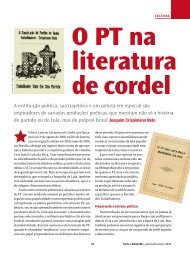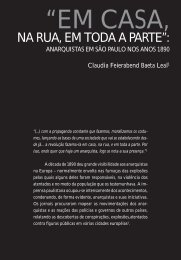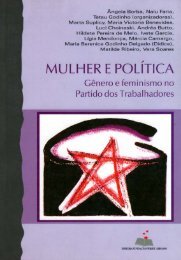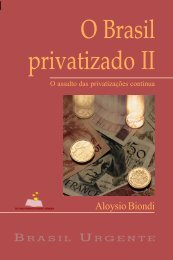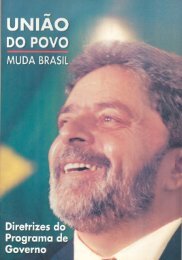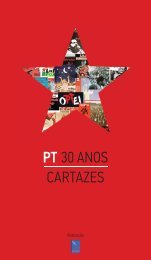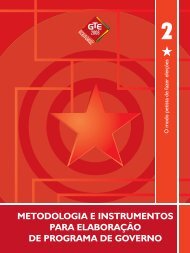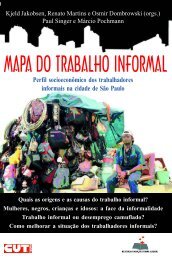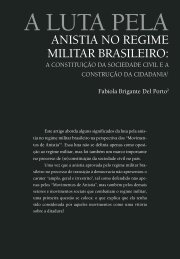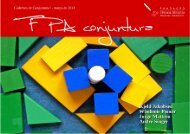em PDF
em PDF
em PDF
Create successful ePaper yourself
Turn your PDF publications into a flip-book with our unique Google optimized e-Paper software.
ABSTRACT<br />
Social theater and engaged theater are two designations among others that<br />
became noticeable during a vivid debate from the late nineteenth century<br />
but consolidated only in the last century. Its point of convergence was the<br />
contexture of the relationship between drama and politics and between this<br />
latter and propaganda. To the English critic Eric Bentley, political theater refers<br />
both to the play and to when, where and how it is represented. This<br />
article focuses on the engag<strong>em</strong>ent matter, by following the historical course<br />
of the theatrical group Forja and the dramatist Plínio Marcos. Th<strong>em</strong>es such<br />
as violence, poverty, solitude, bad social inclusion, individualism, and collectivity<br />
in the capitalist society will be examined, particularly in the play Dois<br />
perdidos numa noite suja (Two lost in a dirty night), from 1966 and staged by<br />
the group Forja in 1984.<br />
KEYWORDS<br />
Theatrical Group Forja; Plínio Marcos; political theater; engag<strong>em</strong>ent.<br />
NOTAS<br />
1 Professora do Instituto de História da Universidade Federal de Uberlândia (UFU),<br />
é autora do livro Era uma vez <strong>em</strong> São Bernardo – o discurso sindical dos metalúrgicos<br />
(1971/1982). Campinas, Unicamp/Centro de M<strong>em</strong>ória/Unicamp, 1999, e editora de<br />
ArtCultura: Revista de História, Cultura e Arte. Este trabalho conta com o apoio fi nanceiro<br />
do Conselho Nacional de Desenvolvimento Científi co e Tecnológico (CNPq)<br />
a partir do Projeto de Pesquisa Teatro e trabalhadores: uma relação tão delicada.<br />
Contato da autora: akparanhos@triang.com.br.<br />
2 Situations, II. Paris: Gallimard, 1948, p. 12-13.<br />
3 Ver STOURAC, R. e MCCREERY, K. Theatre as a weapon: workers’ theatre in the Soviet Union,<br />
Germany and Britain, 1917–1934. Londres: Routledge & Kegan Paul, 1986; COPFERMANN,<br />
E. O teatro popular – por quê? Porto, Portucalense, 1971; e GARCIA, S. Teatro da militância: a<br />
intenção do popular no engajamento político. 2ª ed. São Paulo, Perspectiva, 2004.<br />
4 Ver COSTA, I. C. Panorama do Rio Vermelho – ensaios sobre o teatro americano. São<br />
Paulo: Nankin, 2001.<br />
5 Ver, dentre outros, SAMUEL, R.; MACCOLL, E. e COSGROVE, S. Theatres of the left<br />
1880–1935 – workers’ theatre mov<strong>em</strong>ents in Britain and America. Londres, Routledge &<br />
Kegan Paul, 1985.<br />
6 O chamado teatro político inclui Erwin Piscator e Bertolt Brecht, s<strong>em</strong> falar que<br />
o teatro da crueldade de Atonin Artaud poderia, no limite, ser enquadrado nessa<br />
mesma designação. Sobre o conceito de teatro político, ver WILLIAMS, R. “El teatro<br />
como foro político”. In WILLIAMS, R. La política del modernismo – contra los nuevos<br />
conformistas. Buenos Aires, Manantial, 2002.<br />
7 BENTLEY, E. O teatro engajado. Rio de Janeiro: Zahar, 1969, p. 178. Sobre o ativismo<br />
dos grupos teatrais engajados na América dos anos de 1960, ver GARCIA, S.<br />
e GUINSBURG, J. “De Büchner a Bread & Puppet – sendas do teatro político mo-<br />
281



